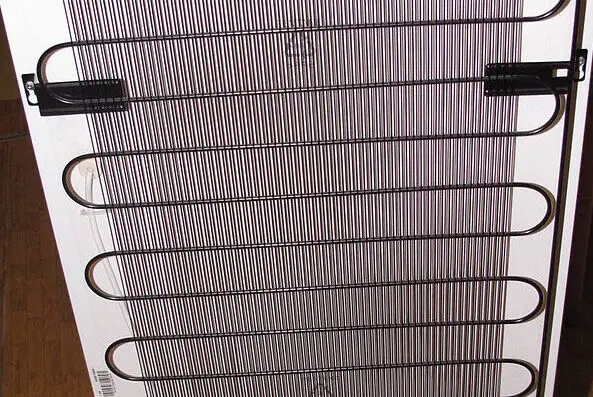Refrigerator condenser problems can sneak up on you like an unwanted summer heatwave. They’re annoying, inconvenient, and can leave you hot and bothered. But don’t sweat it. We’re here to chill things down and help you sort out these issues like a pro.

Table of Contents
Common Refrigerator Condenser Problems
Like any workhorse, your condenser can face a few stumbling blocks. From dirty coils that restrict airflow to blocked fans or even a fan motor failure, these issues can cause your fridge to lose its cool. Refrigerant leakage? That’s another headache that can disrupt your refrigerator’s cooling process.
Dirty Condenser Coils
Over time, dust, dirt, and grime can accumulate on your condenser coils. This layer of dirt acts as an insulator, preventing the coils from efficiently releasing the absorbed heat. This results in increased strain on the condenser, reducing your fridge’s cooling efficiency and increasing energy consumption.
Blocked Condenser Fan
The condenser fan assists the condenser in heat release by circulating air around the coils. If debris or other foreign objects block this fan, it can’t aid in the process effectively. This impediment forces the condenser to work harder to dissipate the heat, potentially causing overheating and other operational issues.
Condenser Fan Motor Failure
If the condenser fan motor fails, the fan can’t operate, hindering the condenser’s cooling process. With no air circulation to aid in heat release, the condenser can overheat, leading to reduced cooling efficiency and possibly causing damage to other fridge components.
Refrigerant Leakage
Refrigerant leakage occurs when there’s a hole or cracks in the coils carrying the refrigerant. This leakage leads to a reduction in the amount of refrigerant available for cooling. Consequently, the refrigerator’s cooling efficiency drops, and it may stop cooling altogether.
Identifying Refrigerator Condenser Problems
Worried your condenser might be facing a problem? Keep an eye out for warning signs such as an unusually noisy fridge, higher energy bills, a hot-to-touch condenser, or even unexplained puddles near your appliance.
Signs of a Dirty Condenser
A dirty condenser may not always be immediately apparent. However, signs to look out for include a rise in your electricity bill due to increased energy consumption, or the fridge’s motor running more frequently as it struggles to maintain the internal temperature.
A dirty condenser might also cause the refrigerator to generate more heat than usual at the back.
Indicators of a Blocked or Failed Fan
If your refrigerator doesn’t cool as efficiently as it used to, or if the condenser coils feel unusually hot to the touch, a blocked or failed fan might be the culprit.
In some cases, you might also hear a loud humming or buzzing noise from the back of the refrigerator, indicating fan issues.
Signs of Refrigerant Leakage
A refrigerant leak can often be identified by a hissing or bubbling noise coming from your refrigerator.
In addition, you might notice small pools of oil or fluid near the refrigerator.
Another key sign of refrigerant leakage is if your fridge is not cooling properly, even when the temperature settings are correct.
Check out these other related articles…
Refrigerator Condenser Fan Noise: 4 Easy Fixes
Refrigerator Condenser Fan Not Running: Fixed in 6 Easy Steps
Refrigerator Condenser Fan Air Direction: Your Easy Guide
How to Clean Commercial Refrigerator Condenser Coils
How to Clean Refrigerator Condenser Coils: A Simple Guide
Condenser Fan and Compressor Not Running: 8 Proven Solutions
Solutions for Refrigerator Condenser Problems
Facing refrigerator condenser problems doesn’t mean you need to hit the panic button. From cleaning your condenser and unblocking your fan to even replacing a fan, these problems often have straightforward solutions. Just remember, some tasks like handling refrigerant leaks are best left to professionals.
Cleaning a Dirty Condenser
Cleaning a dirty condenser involves safely removing the grime and dust build-up from the coils. After unplugging the refrigerator for safety, use a soft brush to gently clean the coils.
Once the larger particles are removed, use a vacuum to get rid of finer dust. Ensure to avoid damaging the coils during the cleaning process.
Unblocking or Replacing a Fan
Unblocking a fan involves carefully removing any obstructions from the fan blades. If the fan motor has failed, replacing the fan might be the best course of action.
It’s crucial to remember that these tasks involve working with electrical components, so if you’re unsure, it’s best to consult a professional.
Handling Refrigerant Leakage
Handling refrigerant leakage is a job for professionals. Refrigerants can be harmful or even deadly if mishandled.
If you suspect a refrigerant leak, shut off your refrigerator and contact a certified technician immediately. Avoid contact with the leaking substance and ensure the area is well-ventilated.
Preventive Measures for Refrigerator Condenser Problems
Prevention is always better than cure, right? Regularly cleaning your condenser, timely inspection and maintenance, and proper usage and care of your fridge can go a long way in preventing these pesky condenser problems.
Regular Cleaning of the Condenser
Like your trusty car, your refrigerator condenser also needs regular servicing. Cleaning it once every six months keeps it humming along nicely.
Timely Inspection and Maintenance
A stitch in time saves nine. Regular checkups can catch potential issues early and save you the headache later. Think of it as the health checkup your fridge needs to stay fit.
Proper Use and Care of the Refrigerator
Don’t overcrowd the refrigerator, and give it some breathing room around. It’s not much to ask for a cool and efficient service, right?
